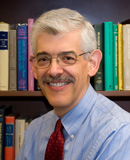
Distinguished Mentor Award
Mentoring an academic superstar is one thing. Providing mentorship to a struggling student requires an entirely different level of commitment, the type of dedication offered by Dr. Clive Baumgarten over his 30 year career at the MCV Campus of VCU.
“Whereas it is often easier to appreciate and adopt the brightest and most talented students as mentees, continuing to invest time and effort without any apparent progress into the development of an academically challenged student poses considerable challenges for a mentor. The latter was my relationship with Dr. Baumgarten,” wrote a former mentee, now a clinical and research fellow in cardiology at Johns Hopkins. “When I faced my toughest academic hurdles and the odds were not in my favor, his unwavering belief in my success motivated me to reach my highest potential.”
While most of the students he has mentored have not faced such signifi cant obstacles, they all are indebted to him. “Without his effort, friendship and guidance, I would never have been able to develop my academic or scientific career,” wrote Samuel C. Dudley, Jr, M.D., Ph.D., Chief, Section of Cardiology, University of Illinois at Chicago. “He taught me to be exacting and creative. I learned how to do experiments, but more importantly how to design them and to interpret the data. He taught me how to write. He has read almost every one of my grants since I have left his lab. In short, I received a career’s worth of mentorship. He is the fi nest teacher, scholar, friend and mentor I know.”
Other current and past mentees thoroughly concur: “Dr. Baumgarten is a mentor who renews passions and kindles the fires of thought.” “His delight in seeing others succeed is an inspiration and develops confi dence in those around him.” “Always learning himself, he reminds me of the joys of life-long study, even when I have been steeped in the mundane.” “His reputation as a researcher and mentor was a major reason I applied to the M.D./Ph.D. program and my experience in his lab only strengthened this view.”
“He gives trainees in his lab the respect and freedom they want and encourages them to explore new directions,” explained Gea-Ny Tseng, Ph.D., Professor of Physiology and Biophysics. “When challenges occur (as they always do in research), he cheers the students on and guides them in the right direction.” Added a former mentee, “He was a patient ear that allowed my excitement to pour forth and a structured guide who helped me frame my ideas about a topic, facilitated clarity of those thoughts and pointed me to useful avenues.”
“The things I remember most distinctly about Dr. Baumgarten are his enthusiasm in scientific research, his dedicated working style, strict scientifi c thinking and optimistic life attitude, which greatly benefi t my career and my life,” added a former colleague. “His encouragement and optimism cheered up everyone in the team and made even the darkest time of the dissertation research more bearable,” said another.
Although Dr. Baumgarten’s optimism was tried recently, “his dedication to his students and his duty as a mentor stood tall even during his greatest personal health challenge,” wrote Diomedes Logothetis, Ph.D., Chairman, Department of Physiology and Biophysics.
“As a mentor, he should be held up as a prototype,” summarized a current M.D./Ph.D. student. “I know I would be honored if someday my own students held me in even half the esteem that I hold him.”